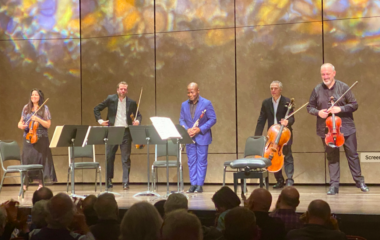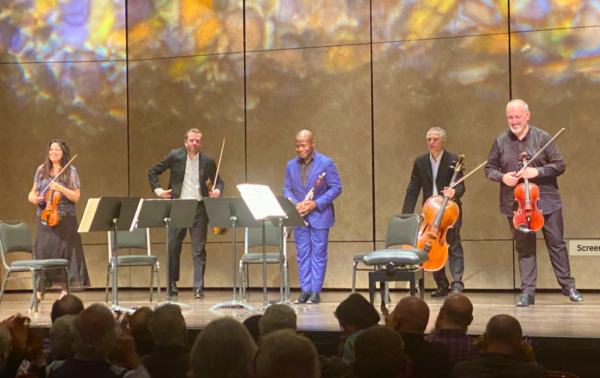 United States Various: Anthony McGill (clarinet), Pacifica Quartet (Simin Ganatra, Austin Hartman [violins], Mark Holloway [viola], Brandon Vamos [cello]). San Francisco Performances, Herbst Theatre, San Francisco, 3.12.2024. (HS)
United States Various: Anthony McGill (clarinet), Pacifica Quartet (Simin Ganatra, Austin Hartman [violins], Mark Holloway [viola], Brandon Vamos [cello]). San Francisco Performances, Herbst Theatre, San Francisco, 3.12.2024. (HS)

Dvořák – String Quartet in F major, ‘American’, Op.96
Ben Shirley – High Sierra Sonata
Brahms – Clarinet Quintet in B minor, Op.115
Anthony McGill’s sound on the clarinet might make the angels in heaven pay attention. The soft tones of sustained pianissimo that composers so love to write for this instrument emerge like a warm hug, barely there but somehow all-enveloping. In the higher register, he can shape a clarion beam, and rapid passages tumble out like the moves of a limber dancer.
The composers on the Pacifica Quartet’s program made great use of these elements. Combined with carefully phrased work from violinists Simin Ganatra and Austin Hartman, violist Mark Holloway and cellist Brandon Vamos, music by Dvořák and Brahms framed a new piece by Ben Shirley to create ear-massaging beauty, the latter two benefiting from the participation of McGill, the New York Philharmonic’s principal clarinet.
Shirley’s High Sierra Sonata, recorded in 2023 on the Pacifica’s Grammy-nominated American Stories, begins (and ends) with a soft, low-lying meditation by the unaccompanied clarinet. The piece features the clarinet in many guises over the three movements, often taking flight against the string quartet’s shifting moods, sometimes on its own. There is a beautifully laid-out cadenza ending the first movement, and some lovely weaving with the strings in the finale. In between, stormy shifts and a jittery spirit play a sort of pinball in music.
The composer was inspired by a sojourn at Owens Valley in the Sierra Nevada mountains of California, as a volunteer at an aid station for the Bishop High Sierra Ultras ultra-marathon. Struck by the constantly shifting weather, from the light clouds of sunny periods to the menacing black clouds of fast-approaching storms, he fashioned the music to turn on a dime from sweetness to a sort of restrained violence.
Dissonance does not play a major role. Moments in the opening movement, ‘Buttermilk Morning’, created a peaceful magic. The second movement, ‘Angry Secrets’, never got too riled up and the mood passed quickly. The finale, ‘Reflections on a Day’, rose to a rather gentle climax from a placid start and receded into hazy serenity.
It worked well as a vehicle to show off the clarinetist’s musical assets. My only cavil is with the form. Having spent many weeks in the mountains over the years, the shifts from one mood to another in Shirley’s music felt too abrupt. True, mountain weather can go through several seasons in one day, but the segues are seldom so abrupt.
Brahms loved the clarinet, especially in the last decade of his life when he wrote two sonatas, a trio and the heavenly Clarinet Quintet in B minor. The latter occupied the second half of the concert – 35 minutes of gorgeous music delivered with particular clarity.
Not at all a showpiece for the clarinet, the quintet is a sterling example of how to use the sonorities of strings and a reed instrument to great effect. The clarinet seldom stands out, as it did in the High Sierra Sonata, but emerges from the harmonies of the strings to add an extra element and, with McGill, a radiant gloss. The magic in this performance was the way he and the quartet found subtleties of tone and texture that at times felt like a slowly turning kaleidoscope.
The opening Allegro began with appropriate hesitation, moving through mini-variations of the first gestures. It reached a climax in which the clarinet took off in dazzling virtuosity before the movement closed with the same hush with which it started. That led to the calming simplicity of a deftly spun Adagio, a simple song that gained more depth with some of Brahms’s most contrapuntal writing, so clear to hear at this slow pace.
The Andantino connected nicely with this before jumping off into some lively gymnastics, managed by this group with both flexibility and precision. The finale, a set of five variations, danced merrily until, as if remembering how things started, it arrived home with a reprise of the opening phrases.
The concert opened with Dvořák’s String Quartet in F major, the ‘American’, doing its best to bring dignity to the composer’s appropriation of what he perceived as Native American tunes. It is either charming or disturbing, depending on one’s politics these days, but all the pentatonic-scale motifs were executed with enough deftness and variation in style to maintain interest. The Pacifica’s lavish attention to contrasting dynamics and bowings could occasionally slide into something mannered, but the focus of this piece set up the sonata’s freedom as a welcome contrast.
Harvey Steiman
